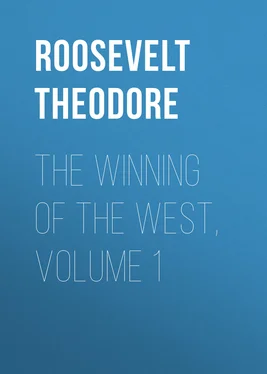Theodore Roosevelt - The Winning of the West, Volume 1
Здесь есть возможность читать онлайн «Theodore Roosevelt - The Winning of the West, Volume 1» — ознакомительный отрывок электронной книги совершенно бесплатно, а после прочтения отрывка купить полную версию. В некоторых случаях можно слушать аудио, скачать через торрент в формате fb2 и присутствует краткое содержание. Жанр: foreign_prose, История, foreign_edu, foreign_antique, на английском языке. Описание произведения, (предисловие) а так же отзывы посетителей доступны на портале библиотеки ЛибКат.
- Название:The Winning of the West, Volume 1
- Автор:
- Жанр:
- Год:неизвестен
- ISBN:нет данных
- Рейтинг книги:5 / 5. Голосов: 1
-
Избранное:Добавить в избранное
- Отзывы:
-
Ваша оценка:
- 100
- 1
- 2
- 3
- 4
- 5
The Winning of the West, Volume 1: краткое содержание, описание и аннотация
Предлагаем к чтению аннотацию, описание, краткое содержание или предисловие (зависит от того, что написал сам автор книги «The Winning of the West, Volume 1»). Если вы не нашли необходимую информацию о книге — напишите в комментариях, мы постараемся отыскать её.
The Winning of the West, Volume 1 — читать онлайн ознакомительный отрывок
Ниже представлен текст книги, разбитый по страницам. Система сохранения места последней прочитанной страницы, позволяет с удобством читать онлайн бесплатно книгу «The Winning of the West, Volume 1», без необходимости каждый раз заново искать на чём Вы остановились. Поставьте закладку, и сможете в любой момент перейти на страницу, на которой закончили чтение.
Интервал:
Закладка:
When hemmed in so that they had no hope of escape, the Indians fought to the death; but when a way of retreat was open they would not stand cutting like British, French, or American regulars, and so, though with a nearly equal force, would retire if they were suffering heavily, even if they were causing their foes to suffer still more. This was not due to lack of courage; it was their system, for they were few in numbers, and they did not believe in losing their men. 82 82 Most of the plains Indians feel in the same way at present. I was once hunting with a Sioux half-breed who illustrated the Indian view of the matter in a rather striking way, saying: "If there were a dozen of you white hunters and you found six or eight bears in the brush, and you knew you could go in and kill them all, but that in the fight you would certainly lose three or four men yourselves, you wouldn't go in, would you? You'd wait until you got a better chance, and could kill them without so much risk. Well, Indians feel the same way about attacking whites that you would feel about attacking those bears."
The Wyandots were exceptions to this rule, for with them it was a point of honor not to yield, and so they were of all the tribes the most dangerous in an actual pitched battle. 83 83 All the authorities from Smith to Harrison are unanimous on this point.
But making the attack, as they usually did, with the expectation of success, all were equally dangerous. If their foes were clustered together in a huddle they attacked them without hesitation, no matter what the difference in numbers, and shot them down as if they had been elk or buffalo, they themselves being almost absolutely safe from harm, as they flitted from cover to cover. It was this capacity for hiding, or taking advantage of cover, that gave them their great superiority; and it is because of this that the wood tribes were so much more formidable foes in actual battle than the horse Indians of the plains afterwards proved themselves. In dense woodland a body of regular soldiers are almost as useless against Indians as they would be if at night they had to fight foes who could see in the dark; it needs special and long-continued training to fit them in any degree for wood-fighting against such foes. Out on the plains the white hunter's skill with the rifle and his cool resolution give him an immense advantage; a few determined men can withstand a host of Indians in the open, although helpless if they meet them in thick cover; and our defeats by the Sioux and other plains tribes have generally taken the form of a small force being overwhelmed by a large one.
Not only were the Indians very terrible in battle, but they were cruel beyond all belief in victory; and the gloomy annals of border warfare are stained with their darkest hues because it was a war in which helpless women and children suffered the same hideous fate that so often befell their husbands and fathers. It was a war waged by savages against armed settlers, whose families followed them into the wilderness. Such a war is inevitably bloody and cruel; but the inhuman love of cruelty for cruelty's sake, 84 84 Any one who has ever been in an encampment of wild Indians, and has had the misfortune to witness the delight the children take in torturing little animals, will admit that the Indian's love of cruelty for cruelty's sake cannot possibly be exaggerated. The young are so trained that when old they shall find their keenest pleasure in inflicting pain in its most appalling form. Among the most brutal white borderers a man would be instantly lynched if he practised on any creature the fiendish torture which in an Indian camp either attracts no notice at all, or else excites merely laughter.
which marks the red Indian above all other savages, rendered these wars more terrible than any others. For the hideous, unnamable, unthinkable tortures practised by the red men on their captured foes, and on their foes' tender women and helpless children, were such as we read of in no other struggle, hardly even in the revolting pages that tell the deeds of the Holy Inquisition. It was inevitable—indeed it was in many instances proper—that such deeds should awake in the breasts of the whites the grimmest, wildest spirit of revenge and hatred.
The history of the border wars, both in the ways they were begun and in the ways they were waged, make a long tale of injuries inflicted, suffered, and mercilessly revenged. It could not be otherwise when brutal, reckless, lawless borderers, despising all men not of their own color, were thrown in contact with savages who esteemed cruelty and treachery as the highest of virtues, and rapine and murder as the worthiest of pursuits. Moreover, it was sadly inevitable that the law-abiding borderer as well as the white ruffian, the peaceful Indian as well as the painted marauder, should be plunged into the struggle to suffer the punishment that should only have fallen on their evil-minded fellows.
Looking back, it is easy to say that much of the wrong-doing could have been prevented; but if we examine the facts to find out the truth, not to establish a theory, we are bound to admit that the struggle was really one that could not possibly have been avoided. The sentimental historians speak as if the blame had been all ours, and the wrong all done to our foes, and as if it would have been possible by any exercise of wisdom to reconcile claims that were in their very essence conflicting; but their utterances are as shallow as they are untruthful. 85 85 See Appendix A.
Unless we were willing that the whole continent west of the Alleghanies should remain an unpeopled waste, the hunting-ground of savages, war was inevitable; and even had we been willing, and had we refrained from encroaching on the Indians' lands, the war would have come nevertheless, for then the Indians themselves would have encroached on ours. Undoubtedly we have wronged many tribes; but equally undoubtedly our first definite knowledge of many others has been derived from their unprovoked outrages upon our people. The Chippewas, Ottawas, and Pottawatamies furnished hundreds of young warriors to the parties that devastated our frontiers generations before we in any way encroached upon or wronged them.
Mere outrages could be atoned for or settled; the question which lay at the root of our difficulties was that of the occupation of the land itself, and to this there could be no solution save war. The Indians had no ownership of the land in the way in which we understand the term. The tribes lived far apart; each had for its hunting-grounds all the territory from which it was not barred by rivals. Each looked with jealousy upon all interlopers, but each was prompt to act as an interloper when occasion offered. Every good hunting-ground was claimed by many nations. It was rare, indeed, that any tribe had an uncontested title to a large tract of land; where such title existed, it rested, not on actual occupancy and cultivation, but on the recent butchery of weaker rivals. For instance, there were a dozen tribes, all of whom hunted in Kentucky, and fought each other there, all of whom had equally good titles to the soil, and not one of whom acknowledged the right of any other; as a matter of fact they had therein no right, save the right of the strongest. The land no more belonged to them than it belonged to Boon and the white hunters who first visited it.
On the borders there are perpetual complaints of the encroachments of whites upon Indian lands; and naturally the central government at Washington, and before it was at Washington, has usually been inclined to sympathize with the feeling that considers the whites the aggressors, for the government does not wish a war, does not itself feel any land hunger, hears of not a tenth of the Indian outrages, and knows by experience that the white borderers are not easy to rule. As a consequence, the official reports of the people who are not on the ground are apt to paint the Indian side in its most favorable light, and are often completely untrustworthy, this being particularly the case if the author of the report is an eastern man, utterly unacquainted with the actual condition of affairs on the frontier.
Читать дальшеИнтервал:
Закладка:
Похожие книги на «The Winning of the West, Volume 1»
Представляем Вашему вниманию похожие книги на «The Winning of the West, Volume 1» списком для выбора. Мы отобрали схожую по названию и смыслу литературу в надежде предоставить читателям больше вариантов отыскать новые, интересные, ещё непрочитанные произведения.
Обсуждение, отзывы о книге «The Winning of the West, Volume 1» и просто собственные мнения читателей. Оставьте ваши комментарии, напишите, что Вы думаете о произведении, его смысле или главных героях. Укажите что конкретно понравилось, а что нет, и почему Вы так считаете.












